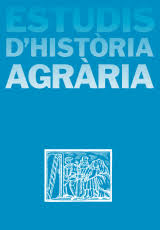Conflicto y violencia en torno al aprovechamiento de los pastos: la Tierra de Campos (1900-1923)
DOI:
https://doi.org/10.1344/eha.2013.25.13-27Keywords:
social disputes, protest, rural society, pastures, Tierra de CamposAbstract
Often, until recently, studies of peasant social disputes have been restricted to expressions of protest that were part of the Marxist dialectic of class struggle (essentially, agrarian strikes). However, as numerous studies have shown, the conflict in the Spanish countryside presented very different expressions. In this paper, our intention is to stress this historiographical opinion and set out a new perspective on peasant social conflicts. To do this, we focus our analysis on conflict framed around the management and use of natural resources, in particular, of pasture. It includes the traditional collective protests associated with the exploitation of pastures, everyday forms of individual resistance such as abusive grazing, or serious interpersonal violence between shepherds, farmers and local authorities (mainly municipal wardens of the countryside). The study focuses on the region of Castile and Leon called Tierra de Campos between 1900 and 1923, a period marked by the emergence of the labour movement in the Spanish countryside which, however, did not lead to an abandonment of old conflicts separate from class conflict.Downloads
Published
2013-01-01
Issue
Section
Dossier
License
From issue 29 (2017), when submitting a proposal, the author retains the copyright but grants the journal the first publication of the work.
The texts will be disseminated under the Creative Commons licence Attribution Non commercial (CC-BY-NC) which allows the work to be shared with third parties, provided that authorship is acknowledged, the initial publication in this journal, the conditions of the licence are met and no commercial use is made.



